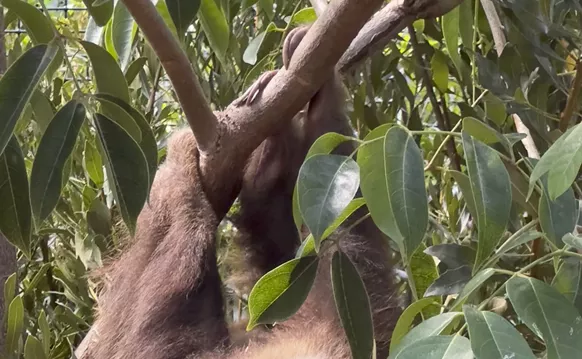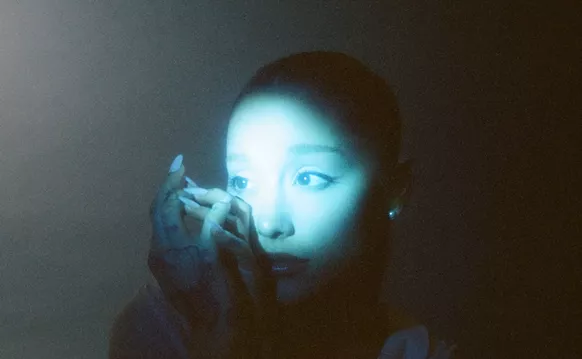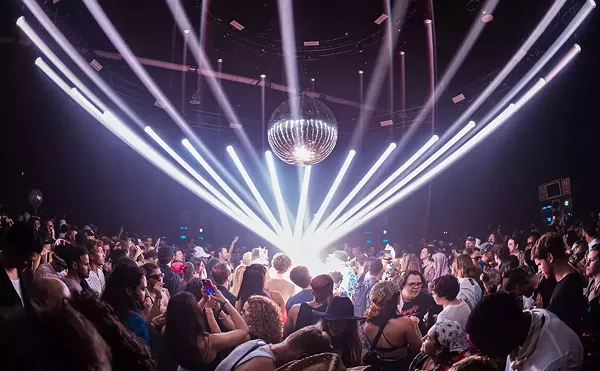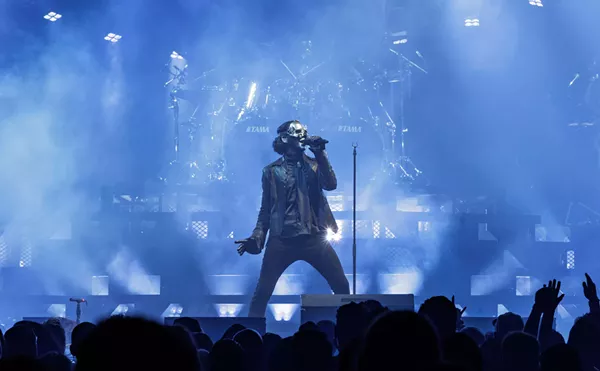Some people will remember Adam Matza from his days with the Baboons, pioneers of South Florida's genre-defying musical amalgams that blended from everywhere and filtered out one heavily percussive party of lackadaisical fun. He's been a poet and spoken-word performer before that was really a "thing" locally, and he's also experienced the highs and lows of life, as an artist and as a person.
For a while now, he has turned his musical attentions to experimental sounds and has fully embraced and immersed himself into the developing technologies of tablet-based music/instrumentation applications and is set to release his latest album, Refractions & Echoes, next month. Matza is also one of the most earnest and involved supporters of South Florida's varied underground, and we had a chance to catch up with him and discuss his work's evolution and process as an artist.
See also: The Weeds Move From Beat Poetry to Ambient Sounds
Talk to us about your transition as an artist from spoken word and more traditional music to experimentation and noise.
I've always been an experimentalist. I'm a restless spirit and am always wondering what's possible. Starting in 1989 and continuing off and on until 2004, I was a solo spoken-word performer and then a frontman for a couple of pretty popular South Florida bands, the Baboons and the Weeds. When I began, people had no idea what spoken word/music was. I knew I was part of a long tradition, but it was alien to a lot of people. Both bands were highly rhythmic, energetic, and percussion-heavy, and I was a nutcase behind the mic.
By 1996, spoken word/music was being accepted into the mainstream, and the Weeds had some interest from Mercury's Mouth Almighty Records. Unfortunately, they skewed heavily toward the Nuyorican poetry scene in New York and ultimately chose to not sign the crazy guy from South Florida, even though we put out a kick-ass cassette release called Beer. That was disappointing and led me to shelve the band for six years. I got inspired and picked it up again in 2003 with a new release called In Between Stations, which was really well-received. I rode that wave for about a year and a half and then decided it was time to grow up and get serious about my life. It's funny to say that now, but at the time, it was what I needed to do.
In 2012, I got together with the guys from the Weeds [drummer Jim Seidel, bassist Ed Ethridge, and percussionist Rey Diaz] to see if the old magic was still there. After all, the world was ending in December, so we were taking stock. Unfortunately, it felt like I was doing a Weeds cover band and it turned me off. I wasn't surprised. My poetic output had slowed after 2004 and my life became career focused. I lived in San Francisco for a few years and had a tragically long relationship that should have ended within eight weeks, rather than the eight years it took. I worked on a poem called "Satellite Star After You've Been Popped" for almost a decade. I really love the finished product, but one poem in 10 years?
After the Weeds reunion, I felt like I had something to express, but for the first time, words did not feel like the way to do it. Then one day I caught a YouTube video that showed Kimbra performing solo at SXSW. She was using an iPad as part of her set up and was doing vocal percussion loops, while singing multiple parts over them. All on the fly. All live. I was intrigued. I researched what she was using (it turned out to be Loopy HD) and that's when I discovered the Animoog iOS synth app. From the first moment I touched the screen, I was able to create interesting sounds. My musical partner at the time started calling me the "Jimi Hendrix of the iPad." It was pretty heady hype from a musician I respect.
For a year, we created improvisational ambient compositions as the Weeds, releasing two recordings, This Is Jambient and Blee. I continued to discover and incorporate more and more synth apps and drum machine apps. At times, I played two iPads simultaneously. Once Audiobus -- an app that links musical apps -- came out, I no longer needed two iPads. These instrument apps are deep and expressive, and remarkably affordable compared to hardware. With Audiobus, I can combine multiple synths, drum machines and effects. It is a constant experiment.
About a year ago, my musical partner had a psychotic breakdown and I found myself on my own musically for the first time since I was a solo spoken word performer. One night, in anticipation of a show at the Poorhouse opening for the Johnsons, I got together with Sharlyn Evertsz and Kenichi Ohme at the Shack in Hialeah. I intended to do spoken word with their music, but just for the heck of it, I brought my iPad. After a little bit of spoken word, I fired it up and started jamming with them. I quickly realized that ambient and noise worked really well together and that I needed to focus on sound rather than poetry. In the months that followed, I experienced an explosion of creativity. It felt like I had been released from captivity.
With the iPad, you can play and record at the same time. I record almost everything I do and release at least 90% of it on Soundcloud, where I have built a nice following that includes people all over the world. Eventually, I choose the best stuff and release it as an official digital album on Bandcamp. Refractions & Echoes is the third album I've released in the last 18 months.
The link between what I did before and what I do now is improvisation. The Baboons was improvisational out of need because the players rarely remembered the arrangements and I was then forced to figure out how to work with what they were giving me. The Weeds was purposely improvisational. We considered ourselves an anti-band and never rehearsed. We just played all the time. Improvisation is where I like to be creatively; in the moment and doing it for the first time right now. It's like being on the high wire without a net. That's when, where and how my best stuff comes out.
What kind of cues do you take when experimenting? Is there a vestige of the organic within your digital approaches?
I approach what I do as storytelling with sound. Now, as always, I believe in musical multi-dynamics. I want what I do to be loud and soft, fast and slow, intense and contemplative, spacey and crescendo-ing. And everything in between.
Just as a good storyteller understands the inner rhythms and harmonies of words, sentences and paragraphs, the rises and falls in action, the climaxes and releases and the denouement, I apply those same principles to the sounds I make.
In 2011, I discovered the Krautrock music scene of the late '60s and early '70s, and bands like Cluster, CAN, NEU!, Tangerine Dream, Harmonia, Kraftwerk, and Popol Vu became hugely influential on me -- joining thousands of others -- particularly their spirit of innovation and experimentation. When I started playing music on the iPad, that spirit was pretty apparent.
I see everything I do as organic.
Regardless of what tool you use to create; it comes down to two important things: does it resonate emotionally and does it say something? If it does, then you are connecting with your audience. If you can do that, then you are succeeding as an artist.
This album, Refractions & Echoes, has a differentiating gradient of recording applications, from the "live" to the collaborative, how much of it was deliberate and is this varied approach part of the experimentation?
All of it is experimental and all of it includes deliberate choices. I record almost everything I do. With the exception of one collaborative piece ("Cork") with an experimental musician from Ireland named Gunther Berkus, whom I have never met, everything on Refractions was done live and in the moment, which included pieces recorded alone in the studio, as well as pieces recorded live in front of an audience. I can feel and hear the differences between those two scenarios. The studio work feels more intimate and personal. The live stuff feels bigger and broader. This makes sense because the studio pieces on Refractions were played and monitored alone through headphones, while the live stuff was done through big sound systems in front of people.
You've had a rough year, at a personal level, how much of that has affected/shaped your output?
It has been a difficult year, but it has also been transformational. When I think about all that has happened, it seems pretty awful. But the growth I have experienced from it far exceeds the negatives, with the exception, of course, of my dad dying. There's nothing that makes that feel good.
I guess it's like with any type of artistic expression; what you feel is what you produce.
I had a weird realization fairly early on as a solo experimental performer. One night in March, I was on my way to play at Kenny Millions' Be Creative Or Die event at Churchill's. I was at the tail end of a bad relationship and found out on the way to the show that one of my best friends had OD'd on pills about an hour before.
Under almost any other circumstances, I likely would not have played music that night. But I was scheduled to play at Churchill's for Kenny, and the show must go on. What I played that night was incredibly dark and harsh. Without conscious intention, I was channeling what I was feeling into sound. This has happened over and over. Both before that night and since. I love that aspect of what I do. I love to play.
The night my father died on July 3, I played a show I produced at Space Mountain in Miami called "Lost Is More." Two days later, I played the Alvarez Brothers' Audio Junkie event at Gramps. Both were incredibly difficult and emotional experiences, but I am glad I went through with them. I'm also glad I didn't record what I played the night my dad died.
You're working with iOS-based synths, what are their advantages/disadvantages and how did you come to streamline your process using them as opposed to more traditional instruments?
The biggest advantages are cost and simplicity of set up. I have all my instrumentation -- and it is a lot of instrumentation -- in my iPad. I also have my recording capability there, too. The biggest expense outside of the iPad itself has been the ridiculous amount of amplification I have purchased.
Music apps can get expensive when you want to try everything like I do, but compared to the cost of hardware and outboard gear, it is minimal. Audiobus was a godsend. With it, you can play multiple apps at the same time, run them through effects and record it all. Early on, I even mixed and mastered everything in the iPad. Since then, I have moved on to ProTools in my iMac for post-production. It really doesn't get much more streamlined than that.
These apps are real instruments. They are complex and capable of amazingly expressive sounds. The only disadvantage I have found is limitations in the iPad processor. I want to link more instruments and effects than the processor can handle. If I am not careful, I can easily crash the iPad. This has compelled me to limit myself and hone in on what I really want to do in the moment. Still, I can't wait for the next generation of iPad to come out with more RAM, a more powerful processor and maybe even a larger screen.
There's a wildly disparate time-stamp in your work, you go from thick and fully-realized tracks in the four to five minute range to lofty, almost space-like endeavors that reach beyond the 20 minute mark; how much of your work is pre-planned versus improvised?
It's all improvised.
That said, I want there to be a variation in the length of the pieces for the same reasons I want the music to be multi dynamic, and for the same reasons I vary sentence and paragraph length when I write: because that's what makes it interesting to me and hopefully to the audience.
The only planning I do before a performance or a recording session is picking which instruments I am going to play. Otherwise, I am often choosing sounds at the moment I am playing them. After two obsessive years, I really know my way around these instruments, so I'm usually not just flailing around. But I do make every effort to get out of the way, consciously speaking, and allow whatever it is that is going on to flow through a passage from my brain to my fingertips. I just trust at that point that my philosophy of multi-dynamics and storytelling through sound will carry the moment. I live for those moments. I love those moments.
That doesn't mean it's always easy. You're going to inevitably fuck something up. Something is going to happen you don't expect. I love those moments, too. Miles Davis said that there are no mistakes and that if you play a wrong note, what determines whether it is good or bad will be the next note you play. Put another way, if I get myself into something, it's up to me to get myself out of it and hopefully make it interesting and compelling.
Doing it is like a meditation for me. I'm surprised sometimes to end a session and see that I just played for 20 or 30 minutes. Time just zips past. In a live setting, I am much more aware of how much time I have. I'm a team player and hate being the reason for a show to get behind schedule.
After this release, what is next for you personally and artistically?
Personally, I want to continue being an experimental musician because it makes me happy. My most important personal pursuit is happiness. At 47, what else is there?
Artistically, I want to continue experimenting and recording in my studio, and keep putting out new releases. I also want to continue playing in front of audiences because it is the greatest high in the world and the most important way to gauge the effect the music is having. Performing gets in your blood and never goes away.
Much like poets push the language into new and uncharted places, experimental musicians push sound past the edge. I love all kinds of music and believe that every genre has countless numbers of artists who do great things. I want to hear it all and let it all influence me, both artistically and personally. That said, I think a lot of people who are into live music these days are rather narrow in what they like to hear. I want to expose them to new sounds and different musical approaches.
That's how I remember the really terrific original music scene we had down here in the '90s. Lost of different people checking out different scenes, hearing different bands and different styles in different places. Lots of art, music and fashion. With Squeeze and the Reunion Room, Fort Lauderdale was such an important part of that equation. It feels like things are about to explode culturally here, and not a moment too soon.
Because of people like Rat Bastard and Kenny Millions, we have a vibrant experimental music scene here. It really is one of the best in the world. I want to collaborate with other players. I want to put on shows in new venues, particularly near my home in Fort Lauderdale. I want to cross-pollinate different types of vanguard art and mix audiences together. Among the things I have going on is a show for late November that will put eight or nine of the best experimental players in South Florida onstage together at the same time with many hours to stretch out and see where the music take us.
All I have ever wanted is to see where the music takes me.
New Party Rules for Millennials
Top 20 Sexiest R&B Songs from the '90s to Today
Ten Best Florida Metal Bands of All Time
Ten Most Annoying Drunk Dudes You Meet at a Bar
Follow @CountyGrind












